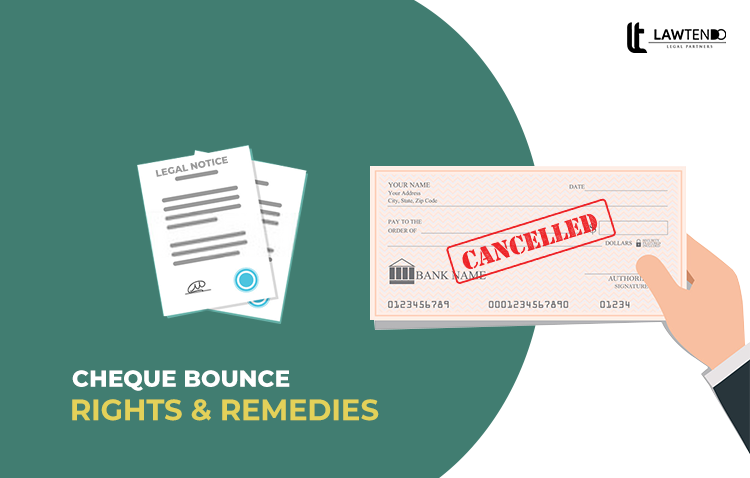All you need to know about Cheque Bounce

Date : 05 Mar, 2020
Post By Adv. Shimpy Arman Sharma
With the rise in usage of negotiable instruments as an alternate method of transaction in various businesses, there has been a significant rise in the cases of “cheque bounce”. Issuing of post-dated cheques in favour of the drawer is somewhat common practice in many business transactions to provide a “breather” to the drawer. A bill of exchange that is drawn upon a specified banker and payable on demand by that banker is called a cheque. A cheque is said to be “bounced” or “dishonoured” on the instances wherein the cheque when presented to the bank is declined due to reasons such as : Insufficient balance in the account Overwriting ‘ Expired validity of the cheque Mismatch of accounts or digits Signature mismatch Damaged cheque Account closed, etc As per the report of our Hon’ble Supreme Court, there are over 40 lakh pending cases of cheque dishonour in India Section 138, Negotiable Instruments Act, 1881 The Negotiable Instruments Act, 1881 is the principal and primary law that governs and deals with the cases pertaining to the dishonour of cheques. The provisions of section 138 of the NI Act, 1881 are provided with an objective to ensure that the obligations which accompany such deferred payment are honoured. The ingredients which classify a case as that of cheque bounce are: A person must have drawn a cheque in favour of another in lieu of discharging his debt. The cheque should be presented within a period of three months to the bank. The cheque should be returned by the bank, unpaid. The payee should communicate and demand such failure of payment within 15 days of being intimated of the same by the bank The drawer fails to make the payment within 15 days of such intimation by the payee. Resubmission of the cheque On being informed about the event of cheque bounce the issuer of the cheque is granted an opportunity to rectify the error due to which the cheque had been returned by the bank, unpaid and direct the payee to resubmit the cheque for clearance. This can be done within three months from the date when the cheque was bounced. It should be noted that the cheque should be presented to the bank within three months from the date of its issue otherwise the cheque would expire and the claim for cheque bounce shall stand void. If the cheque is returned, unpaid by the bank even after its resubmission, the recipient of the cheque can send a well-drafted legal notice by a competent lawyer to the issuer of the cheque directing him to transfer the due and requisite funds within 15 days from the date of receiving such legal notice, failing which the recipient of the cheque shall have the authority to proceed to approach the relevant court of law. Such demand/ legal notice has to be sent by the recipient of the cheque within thirty days of receiving the bounced cheque intimation by the bank. In cases where such legal notice is sent after the expiry of thirty days, the court may grant condonation of delay in the cases in which the reason for the delay is deemed fit and justifiable by the court. Filing of Complaint If the issuer of the cheque fails to duly respond to the legal notice, the recipient of the cheque can approach the relevant court of law to file a case under: Section 138 of the Negotiable Instruments Act,1881 The defaulter under the section shall be liable to pay a monetary fine or imprisonment for up to two years or both. In a case where the issuer has had a history of duping and fraud and the aggrieved party wishes to take stringent action against the defaulter then a criminal case under section 420 of IPC for cheating can be filed. 3. Order XXXVII of the code of civil procedure, 1908 ( Summary suits/Recovery suits) - A civil case under order XXXVII of CPC can be filed for recovery of the due payments. The provision under the order XXXVII is explicitly applicable for all the recovery issues with respect to bills of exchange, promissory notes. Hundies or in cases where the plaintiff only seeks relief for recovery of debt or liquidated demand in money payable on a written contract, or enactment where the sum to be recovered is fixed. For an issuer who has been slapped with a shammed legal notice in case of a dishonoured cheque, it is very important for him to engage a competent lawyer who shall be able to present the correct facts in the court of law and protect him against any proceedings initiated by the recipient in bad faith. The author of this blog is Adv. Shimpy Armaan Sharma having an experience of 16+ years in handling Recovery related matters from her experience she wants to share this beneficial information for the individuals having any issues with respect to money recovery related matters.





